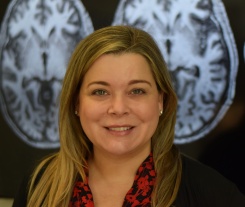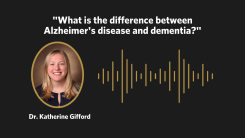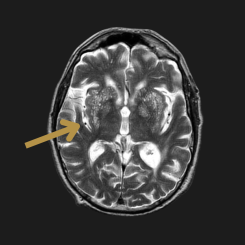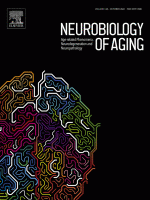Alzheimer’s Genetic Risk Tracked Across Sex and Race
Logan Dumitrescu, PhD, Amalia Peterson, MD, Katherine Gifford, PsyD, Angela Jefferson, PhD and Timothy Hohman, PhD
A recent study led by Assistant Professor of Neurology Dr. Logan Dumitrescu examined how sex affects Alzheimer’s genetic risk, and how those effects differ between race. The genetic association study is the largest known study of its kind, using harmonized data from more than 32,000 research participants aged 60 and older.
Early Brain Changes Predict Functional Decline
Corey Bolton, PsyD, L. Taylor Davis, MD, Dandan Liu, PhD, Bennett Landman, PhD, Katherine Gifford, PsyD, Timothy Hohman, PhD, and Angela Jefferson, PhD
Using Vanderbilt Memory and Aging Project data, researchers found smaller grey matter volume and greater white matter hyperintensities at study entry predicted faster decline in the ability to complete complex tasks.
Grey matter throughout the nervous system enables individuals to control movement, memory, and emotions. White matter hyperintensities are white matter lesions in the brain, which have been associated with cognitive decline.
Center Director Talks Alzheimer’s and Dementia on Newschannel5+ OpenLine
Angela Jefferson, PhD
In June 2023, Dr. Angela Jefferson, Director of the Vanderbilt Memory and Alzheimer’s Center, joined reporter Ben Hall on Newschannel5+ OpenLine to discuss Alzheimer’s disease and related dementias.
In the interview, Dr. Jefferson gave a background on the Center’s research, which is focused on examining the connection between vascular heath and brain health. She points out that cardiovascular risk factors, such as unmanaged high blood pressure, diabetes, and high cholesterol, could contribute to the high incidence of Alzheimer’s disease and dementia in Tennessee.
New Findings Related to Alzheimer's Genetic Risk Factor
Timothy Hohman, PhD, Logan Dumitrescu, PhD, Katherine Gifford, PsyD, and Angela Jefferson, PhD
A genetic variant of apolipoprotein E (APOE), a protein involved in fat metabolism, is the strongest common genetic risk factor for Alzheimer’s disease. However, many APOE-e4 carriers remain cognitively normal throughout life, suggesting there may be modifiers of APOE effects that protect the brain.
Health Conditions Associated with Alzheimer’s
Bennett Landman, PhD
A recent study completed by Dr. Bennett Landman, the Biomarker Core Co-Leader for the Vanderbilt Alzheimer’s Disease Research Center, suggests several health conditions are associated with future dementia. Some conditions were found to begin at least five years before dementia diagnosis.
VMAP Participant Encourages Research Involvement
In February 2023, Vanderbilt Memory and Aging Project participant Tonya Brown shared her study experience with Newschannel5 including why she encourages others to get involved.Black and African American people are nearly twice as likely to develop Alzheimer’s disease as their White counterparts.“A lot of African Americans are afraid to get involved in research, but times have changed,” said Brown. “Anything that I can provide to help find a cure — I feel that I am making a difference.”
Irregular Sleep, Heart Health, and Brain Health
Kelsie Full, PhD, MPH
A recent study led by Dr. Kelsie Full, Assistant Professor of Medicine at Vanderbilt University Medical Center and faculty member at the Vanderbilt Memory and Alzheimer’s Center, found sleep irregularity was associated with a higher risk of atherosclerosis, or hardened arteries. Sleep irregularity is defined as frequently disrupted sleep and varying sleep durations night after night.
“These results suggest that sleeping close to the same total amount of time each night may play an important role in preventing cardiovascular disease,” said Dr. Full.
VADRC Clinical Core Co-Leader Talks Alzheimer's and Dementia on Local 'Let's Talk About It' Podcast
Katherine Gifford, PsyD
In April 2023, Assistant Professor of Neurology and Vanderbilt Alzheimer's Disease Research Center Clinical Co-Core Leader Dr. Katherine Gifford joined the North Nashville Business and Ministries “Let’s Talk About It” podcast along with Community Outreach and Engagement Manager Pam Cowley to answer the community’s questions about Alzheimer’s disease and dementia.
Arterial Stiffness May Impair Cognition
Angela Jefferson, PhD, Dandan Liu, PhD, Taylor Davis, MD, Bennett Landman, PhD, Katherine Gifford, PsyD, Timothy Hohman, PhD, and John Jeffrey Carr, MD.
New Biomarker Shows Promise
Rebecca L Winfree, Logan Dumitrescu, Katherine A Gifford, Kimberly R Pechman, Angela L Jefferson, Timothy J Hohman
New findings from the Vanderbilt Memory and Aging Project suggest sTREM2 (soluble Triggering Receptor Expressed on Myeloid Cells-2) has promise as a new biomarker of brain changes in people with Alzheimer’s disease. Biomarkers are measurable changes in the body that help determine if a person has a disease. The most well-known biomarkers of Alzheimer’s disease are amyloid beta and phosphorylated tau.








